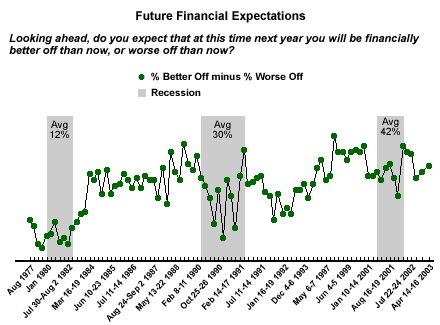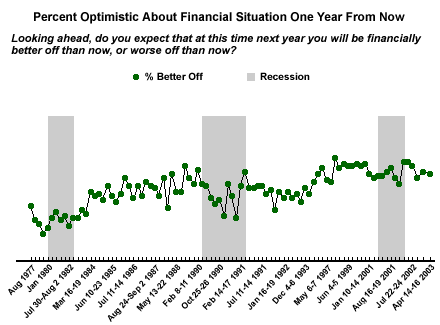As the war-induced fog begins to clear over the economic landscape, much attention is being paid to the mood of American consumers. Gallup's data on personal finance reveal that Americans have remained steadfastly optimistic about their own prospects over the last two years -- more so than they did in previous recent recessions.
Subtracting the percentage of people who believe they will be financially worse off a year from now from the percentage of those who believe they will be financially better off gives a rough measure of people's optimism about future personal finances. Currently, 63% say they expect to be better off, and 16% say worse off, for a net value of 47%. This same measure averaged 12% during the recession of 1980-1982, but stood at a buoyant 42% in the 2001 recession.
Today, even as pundits declare that we are in an extended bear market, the American consumer has a patient and enduring belief that things will turn around. In fact, Americans have remained generally more positive about their personal finances over the last two years than they did in the early 1990s, or in the late 1970s and early 1980s. The current 63-to-16 ratio isn't substantively different from what was measured during the boom years of the late 1990s.
Typically, Americans are very optimistic about future economic conditions as far as their own situations are concerned. In the 26 years Gallup has asked this question, it has found less than a majority expecting to be better off a year hence only a few times (generally during or close to a recession), and never have more expected to be worse off than better off. Since the economic recovery in the 1980s, including the 1991 recession, in only a few instances have less than a majority expressed optimism.

Are Prospects for Household Balance Sheets Really Improving?
Americans have remained optimistic about their future personal financial situations despite a stream of troubling economic news, fears of a double-dip recession, and a bear market compounded by geopolitical uncertainties. U.S. consumer bankruptcies rose 5% in 2002, and are predicted to reach record highs in 2003. Since the recession started in March 2001, institutions and investors have lost $6 trillion in net worth and more than 2.6 million Americans employed in the private sector have lost their jobs.
Yet in the April survey, when asked if they believe their personal financial situations will be better a year from now, 63% of Americans answered in the affirmative. This number has averaged close to 65% over the last two years, and with the economy still faltering, one has to wonder whether this enduring consumer optimism is just the afterglow of the 10-year expansion of the 1990s, or consumers really perceive that prospects for their household balance sheets are getting better. Gallup data offer compelling evidence to support the latter argument.

The Case for Optimism
Such optimistic consumer data do not seem inexplicable in light of the fact that consumer spending bankrolled the economic recovery seen in 2002 and has kept the U.S. economy in the black since then. Personal disposable income, which usually falls during recessions, grew in real terms in 2001 and 2002, despite the recent economic contraction. Supported by strong productivity growth, real incomes grew by 4.5% in 2002. Households have lost $4.2 trillion in wealth to date since the collapse of the markets in 2000, but as a result of the $5 trillion wealth increase in 1999 and the cushion provided by the rising value of home equity, the cumulative negative wealth effect is not as devastating as it might appear.
This wealth erosion was also softened by the fact that stock ownership is concentrated in upper-income groups, so the negative wealth effect has been weathered mainly by America's wealthiest households. The net worth of households today is 7% higher than in 1998. Moreover, with Fed interest rates at a 40-year low, consumers have aggressively restructured their debt to bring down their cost of borrowing and sustain discretionary spending. Even as the inevitable refinance slowdown occurs, the data are telling us that we can bank on consumers to pull us through for another year at the very least.
Bottom Line
Americans are optimistic about their personal financial situations in the year ahead, and have strong balance sheets to justify this sentiment. If businesses step up and increase capital spending and hiring, this could mark the beginning of a sustained economic turnaround.
*Results are based on telephone interviews with 1,011 national adults, aged 18 and older, conducted April 14-16, 2003. For results based on the total sample of national adults, one can say with 95% confidence that the maximum margin of sampling error is ±3%.
